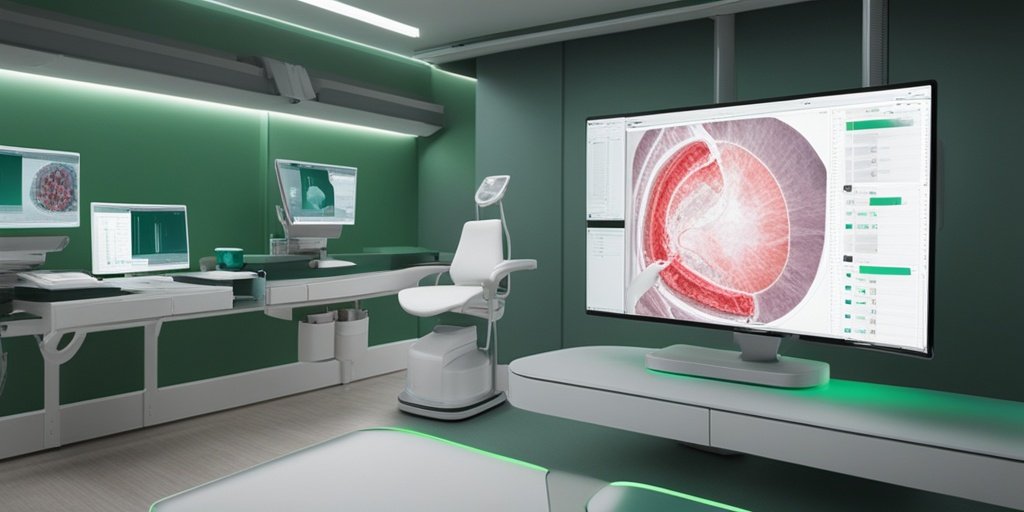⚡ Quick Summary
This study developed RUBY-THYRO, an automated process utilizing convolutional neural networks (CNNs) to extract and structure data from electronic health reports (EHRs) in thyroid pathology. The results demonstrated high performance, with 30 out of 42 variables achieving metrics exceeding 90% across test and validation sets.
🔍 Key Details
- 📊 Dataset: 1,500 patients with thyroid pathology
- 🧩 Features used: EHRs from surgeon visits, ultrasound, surgery, and anatomopathology reports
- ⚙️ Technology: Six distinct CNN models from SpaCy
- 🏆 Performance: 30 variables exceeded 90% in precision, recall, and F1 score
🔑 Key Takeaways
- 🤖 RUBY-THYRO showcases the potential of AI in enhancing thyroid pathology assessments.
- 📈 High performance was achieved across multiple variables, indicating robustness.
- 💡 Automated data extraction can significantly improve initial assessments of thyroid nodules.
- 🏥 Surgical and preanesthesia reports demonstrated particularly high performance metrics.
- 🌍 This study paves the way for comprehensive data warehouses in healthcare settings.
- 🔍 42 variables were selected and manually annotated by clinical experts for accuracy.
- 📊 Evaluation metrics included precision, recall, and F1 score against a gold standard database.

📚 Background
Thyroid nodules are prevalent in the general population, and assessing their malignancy risk is crucial for patient care. Traditional methods often require surgical exploration for indeterminate nodules, highlighting the need for improved initial assessment techniques. The integration of artificial intelligence, particularly through natural language processing (NLP), offers a promising avenue for enhancing data extraction from electronic health records.
🗒️ Study
The study involved a cohort of 1,500 patients with thyroid pathology, randomly selected for model development. The cohort was divided into training (70%) and validation (30%) sets. Researchers utilized EHRs from various clinical interactions, focusing on 42 variables of interest, which were manually annotated by clinical experts to ensure accuracy. The RUBY-THYRO model was developed using six CNN models, supplemented with keyword extraction rules and postprocessing techniques.
📈 Results
The performance of RUBY-THYRO was impressive, with the majority of the selected variables achieving metrics exceeding 90% in both test and validation sets. Notably, the pathologic tumor stage score achieved a perfect 100% in precision, recall, and F1 score, while the number of nodules showed lower performance metrics of 45%, 28%, and 32% respectively in the test set. Surgical and preanesthesia reports were particularly strong performers.
🌍 Impact and Implications
The successful implementation of a CNN-based NLP approach for data extraction in thyroid pathology signifies a major advancement in the field. This technology not only enhances the accuracy of initial assessments but also has the potential to create comprehensive, hospital-wide data warehouses. Such innovations could lead to more efficient patient care and improved outcomes in thyroid pathology and beyond.
🔮 Conclusion
This study highlights the transformative potential of artificial intelligence in healthcare, particularly in the realm of thyroid pathology. By utilizing advanced NLP techniques, healthcare professionals can achieve more accurate and efficient data extraction from EHRs. The future of AI in medicine looks promising, and further research in this area is encouraged to unlock even greater possibilities.
💬 Your comments
What are your thoughts on the integration of AI in thyroid pathology? We would love to hear your insights! 💬 Share your comments below or connect with us on social media:
Enhancing Thyroid Pathology With Artificial Intelligence: Automated Data Extraction From Electronic Health Reports Using RUBY.
Abstract
PURPOSE: Thyroid nodules are common in the general population, and assessing their malignancy risk is the initial step in care. Surgical exploration remains the sole definitive option for indeterminate nodules. Extensive database access is crucial for improving this initial assessment. Our objective was to develop an automated process using convolutional neural networks (CNNs) to extract and structure biomedical insights from electronic health reports (EHRs) in a large thyroid pathology cohort.
MATERIALS AND METHODS: We randomly selected 1,500 patients with thyroid pathology from our cohort for model development and an additional 100 for testing. We then divided the cohort of 1,500 patients into training (70%) and validation (30%) sets. We used EHRs from initial surgeon visits, preanesthesia visits, ultrasound, surgery, and anatomopathology reports. We selected 42 variables of interest and had them manually annotated by a clinical expert. We developed RUBY-THYRO using six distinct CNN models from SpaCy, supplemented with keyword extraction rules and postprocessing. Evaluation against a gold standard database included calculating precision, recall, and F1 score.
RESULTS: Performance remained consistent across the test and validation sets, with the majority of variables (30/42) achieving performance metrics exceeding 90% for all metrics in both sets. Results differed according to the variables; pathologic tumor stage score achieved 100% in precision, recall, and F1 score, versus 45%, 28%, and 32% for the number of nodules in the test set, respectively. Surgical and preanesthesia reports demonstrated particularly high performance.
CONCLUSION: Our study successfully implemented a CNN-based natural language processing (NLP) approach for extracting and structuring data from various EHRs in thyroid pathology. This highlights the potential of artificial intelligence-driven NLP techniques for extensive and cost-effective data extraction, paving the way for creating comprehensive, hospital-wide data warehouses.
Author: [‘Culié D’, ‘Schiappa R’, ‘Contu S’, ‘Seutin E’, ‘Pace-Loscos T’, ‘Poissonnet G’, ‘Villarme A’, ‘Bozec A’, ‘Chamorey E’]
Journal: JCO Clin Cancer Inform
Citation: Culié D, et al. Enhancing Thyroid Pathology With Artificial Intelligence: Automated Data Extraction From Electronic Health Reports Using RUBY. Enhancing Thyroid Pathology With Artificial Intelligence: Automated Data Extraction From Electronic Health Reports Using RUBY. 2024; 8:e2300263. doi: 10.1200/CCI.23.00263